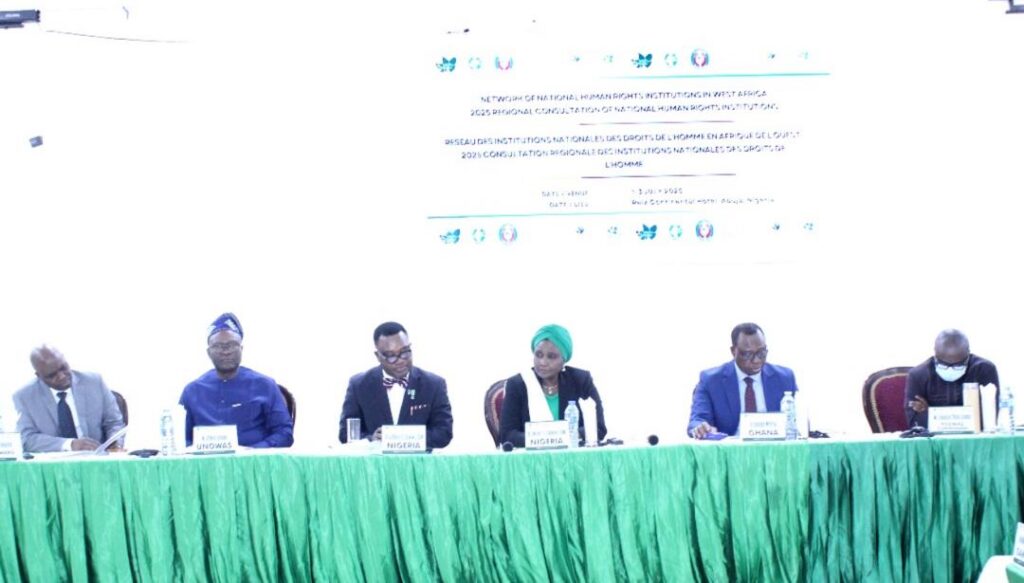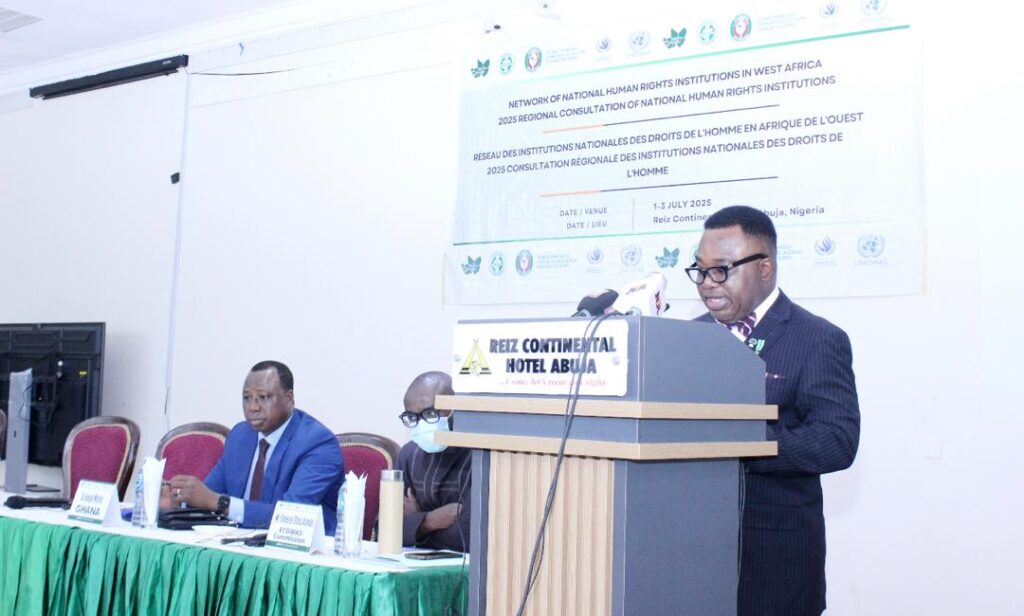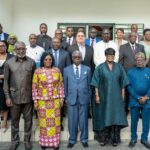ECOWAS Human Rights Institutions Urged to Champion Change, Reparative Justice: Rights and Inclusion.
By Raymond Enoch
In a bold move to tackle the deep-rooted challenges of injustice and human rights violations across West Africa, the ECOWAS Commission has convened a high-level 3-day Regional Consultation of National Human Rights Institutions (NHRIs) in Abuja, Nigeria.
The event, which runs from July 1–3, 2025, marks the 7th regional gathering of its kind, organized by the Department of Political Affairs, Peace, and Security (PAPS) in collaboration with the Network of National Human Rights Institutions in West Africa (NNHRI-WA).

Themed “Justice for Africans and People of African Descent Through Reparations: The Role of NHRIs,” the consultation seeks to chart a unified roadmap for NHRIs to lead efforts in ensuring human dignity, redress for historical and ongoing injustices, and strengthened accountability across the region.
Opening the floor, Dr. Anthony Ojukwu, SAN, Executive Secretary of the National Human Rights Commission of Nigeria, sounded a strong warning about the alarming erosion of human rights across the subregion. He cited military coups, terrorism, internal displacements, climate change, and the shrinking civic space as urgent triggers of concern, urging solidarity among NHRIs to confront these growing threats and reclaim democratic values and freedoms.

“The call for reparatory justice is not just about the past—it is about how we define dignity, equity, and accountability today,” Dr. Ojukwu declared.
Speaking on behalf of ECOWAS, Mr. Ebenezer Asiedu, Head of Democracy and Good Governance, delivered remarks on behalf of Ambassador Abdel-Fatau Musah, Ph.D., ECOWAS Commissioner for Political Affairs, Peace, and Security.
He acknowledged Nigeria’s pivotal role in hosting the dialogue and stressed the significance of embedding reparatory justice within the framework of transitional justice—a concept ECOWAS is actively shaping. He called on participants to provide input on a forthcoming regional transitional justice framework, which aims to embed reparative principles at its core.
“We must adopt a human rights-based approach to justice—past, present, and future,” Asiedu urged. “Our people demand more than apologies. They deserve systems that prevent repeat violations and provide meaningful redress.”
Declaring the Consultation officially open, Dr. Salamatu H. Sulaiman, Chairperson of the Governing Board of Nigeria’s NHRC, called on participants to embrace collective action, stressing that the road to reparative justice must be paved with multi-stakeholder partnerships, sustained advocacy, and genuine political will.
“Justice is the bridge to reconciliation,” she said. “Let us seize this opportunity to recommit ourselves to the ideals of human rights, dignity, and unity.”
In a show of international solidarity, Mr. Benjamin Hounton of the UN Office of the High Commissioner for Human Rights (OHCHR) and Ms. Barrie Lynne Freeman, Deputy Special Representative of the UN Secretary-General for West Africa and the Sahel, both offered goodwill messages. They lauded the Consultation as a crucial platform for peer-to-peer dialogue, accountability, and regional synergy, especially as West African states navigate a shifting political and human rights landscape.
The forum attracted senior officials, including Nigeria’s Attorney-General and Minister of Justice, Hon. Prince Lateef O. Fagbemi, SAN, Dr. Joseph Whittal, President of the NNHRI-WA and Commissioner for CHRAJ (Ghana), alongside Heads of NHRIs** from across ECOWAS member states.
Their collective presence underscored the strategic importance of the dialogue—not just as a ceremonial gathering, but as a working conference to shape future policy and practice in the area of reparatory justice and human rights protection in West Africa.
As the 50th Anniversary of ECOWAS is commemorated, the Abuja Consultation stands as a reminder of both unfinished business and renewed hope—a clarion call to transform principles into practice, and rhetoric into justice.









